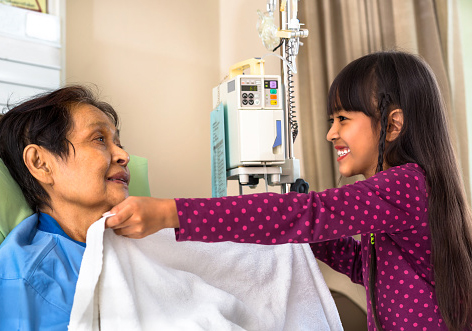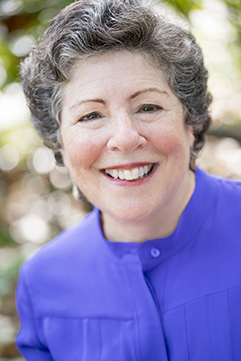
“My mother is sick and I know seeing the kids will cheer her up but I’m worried about the effect on my kids,” a parent wonders. “How can I prepare them?” This is a great topic for parents to want to address. Advanced planning can make a visit to someone sick a positive experience for both the patient and the child.
Visiting the sick (bikur cholim) is an important mitzvah (commandment) in Judaism, but preparing kids in advance is crucial. Fortunately, our Jewish tradition gives us practical suggestions that can help children feel prepared and empowered to successfully visit with a sick person, whether in person or virtually.
Of course, how we visit depends a lot on the child’s age and emotional state, as well as the nature and circumstances of the person’s illness. Sometimes an actual, physical visit is the best choice, even though it might be a little unsettling for your children. Other times, an in-person visit may not be physically or psychologically the best choice, and a virtual visit by phone or other technology might be best.
In either case, here are some practical suggestions from the Jewish tradition that will help prepare your children to visit their loved one and, in the process, teach them how to be strong, kind, caring people.
- Prepare your child. Before the visit, explain to your children in a calm, matter-of-fact way what they might see, such as changes in appearance, medical equipment, limitations of the patient, etc.
- Be considerate. It’s also important to schedule the visit at a time suitable to the patient’s needs. Talk this through with your children and guide them toward thinking about the best time to visit, taking into consideration factors such as visiting too early (which may not give the sick person time to prepare) and visiting too late in the day (when the patient may be too tired). This is a great exercise in helping kids develop empathy by putting themselves in another person’s shoes.
- Plan conversation. Also before visiting, decide with your kids what might be positive and interesting conversation for the person who is sick. Think about news that might make them smile, adventures the children have had, funny books they’ve read, jokes, sports or something they’re excited about. According to Moses Maimonides, a great rabbi and physician, “Telling the patient happy stories expands the heart.”
- Think food. Maimonides also suggested, “One should never forget to strengthen the patient’s physical vitality with nourishing food.” Thinking about what food a sick person can and might enjoy, and then delivering it, is a way to make the visit easier for children because it gives them something concrete they can do to cheer up the patient. If an in-person visit is not appropriate, kids can be involved in planning to have the food delivered.
- Play games. You may want to bring along a quick, light game your kids can play (even virtually, if necessary) with the person who is ill or with another visitor. Bringing a game can help kids feel more comfortable and ease them into interacting with the person they’re visiting. Watching kids play and enjoy themselves can be wonderfully healing and distracting, bringing the patient some joy. Card games, word games, or guessing games are especially good because they are interactive. Electronic devices are not great in this situation because they tend to take away from sharing and interpersonal bonding.
The bottom line: Sometimes it’s difficult to know how to reach out to a sick person – and that’s why Judaism provides us with guidelines to help us know what to do. When we encourage our children to visit with someone who is sick, we bring comfort to others and in the process help our children become kind and caring people. As it says in the Talmud, “The reward for visiting the sick is unlimited.”
Marilyn Gootman, along with Maurice Elias and Heather Schwartz, is the author of The Joys and Oys of Parenting: Insight and Wisdom from the Jewish Tradition (Behrman House Publishing). Marilyn is a member of Congregation Children of Israel in Athens GA, where she runs the synagogue’s PJ Library program and is a long-standing member of the temple’s education committee.

